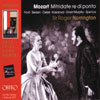Mozart Mitridate, Re di Ponto
Two stand-out performances but overall this live recording must give way
View record and artist detailsRecord and Artist Details
Composer or Director: Wolfgang Amadeus Mozart
Genre:
Opera
Label: Festspiel Dokumente
Magazine Review Date: 1/2007
Media Format: CD or Download
Media Runtime: 152
Mastering:
Stereo
DDD
ADD
Catalogue Number: C703062I

Tracks:
| Composition | Artist Credit |
|---|---|
| Mitridate, Re di Ponto |
Wolfgang Amadeus Mozart, Composer
Bruce Ford, Mitridate, Tenor Christiane Oelze, Sifare, Soprano Cyndia Sieden, Aspasia, Soprano Heidi Grant Murphy, Ismene, Soprano Larisa Rudakova, Arbate Roger Norrington, Conductor Salzburg Camerata Toby Spence, Marzio, Tenor Vesselina Kasarova, Farnace, Mezzo soprano Wolfgang Amadeus Mozart, Composer |
Author: Richard Wigmore
Despite temperamental singers and the obligatory backstage intrigues, Mitridate, premiered in Milan in 1770, was Mozart’s first great operatic triumph. Drawing loosely on Racine, the plot focuses on the rivalry between the king, Mitridate, and his two sons – the faithful Sifare and the devious Farnace – for the hand of Princess Aspasia; this being Enlightenment opera seria, Farnace is overcome by remorse and Sifare duly gets the girl. Virtuoso display is the order of the day, with extravagant bravura arias tailored more to the singer than the dramatic situation. But amid the conventional note-spinning there are numbers of striking beauty: Mitridate’s tender opening cavata; Farnace’s eloquent aria of remorse; the impassioned G minor Act 1 aria for Aspasia, torn between love and duty; or, most moving of all, the Gluckian ombra scene where she prepares to take poison.
Of the two previous recordings, the more theatrical, by far, is the Decca set vividly conducted by Christophe Rousset. While that remains a first choice, this live Salzburg recording offers fair value on two mid-price discs. There are wholesale cuts in the recitatives (which few will lament) and nips and tucks in the arias that will worry some more than others (my only serious regret was the loss of the minor-key central section to Farnace’s fiery “Venga, pur”). As usual, Orfeo provides a synopsis but no libretto. Norrington directs with plenty of dramatic energy, though the recording of the orchestra (modern instruments, period-style bowing and articulation) lacks ideal presence.
There are two outstanding performances. As Mitridate, Bruce Ford, at the peak of his powers, is far smoother and more sympathetic than Rousset’s Giuseppe Sabbatini in the beautiful opening number, and, unlike Sabbatini, conveys fury without coarsening his tone. Christiane Oelze makes a less impassioned Sifare than Bartoli on the Rousset recording. But her sweet, unblemished tone, crystal-clear coloratura and unfailingly elegant sense of phrase give consistent pleasure.
As Aspasia, Cyndia Sieden is exciting in the stratosphere, though lower down – most crucially in the ombra scene – her tone lacks body and colour, even more so by comparison with the magnificent Natalie Dessay for Rousset. Vesselina Kasarova, long a Salzburg favourite, evidently went down well with the Kleines Festspielhaus audience. But the alto castrato role of Farnace, impressively taken on the rival set by countertenor Brian Asawa, lies way too low for her, prompting some forced, ugly tone and grotesque-sounding plunges into a baritonal chest register. I’m glad to have heard this Salzburg performance, above all for Ford and Oelze. Most Mozart lovers, though, will find the stunningly cast Decca recording worth the extra investment.
Of the two previous recordings, the more theatrical, by far, is the Decca set vividly conducted by Christophe Rousset. While that remains a first choice, this live Salzburg recording offers fair value on two mid-price discs. There are wholesale cuts in the recitatives (which few will lament) and nips and tucks in the arias that will worry some more than others (my only serious regret was the loss of the minor-key central section to Farnace’s fiery “Venga, pur”). As usual, Orfeo provides a synopsis but no libretto. Norrington directs with plenty of dramatic energy, though the recording of the orchestra (modern instruments, period-style bowing and articulation) lacks ideal presence.
There are two outstanding performances. As Mitridate, Bruce Ford, at the peak of his powers, is far smoother and more sympathetic than Rousset’s Giuseppe Sabbatini in the beautiful opening number, and, unlike Sabbatini, conveys fury without coarsening his tone. Christiane Oelze makes a less impassioned Sifare than Bartoli on the Rousset recording. But her sweet, unblemished tone, crystal-clear coloratura and unfailingly elegant sense of phrase give consistent pleasure.
As Aspasia, Cyndia Sieden is exciting in the stratosphere, though lower down – most crucially in the ombra scene – her tone lacks body and colour, even more so by comparison with the magnificent Natalie Dessay for Rousset. Vesselina Kasarova, long a Salzburg favourite, evidently went down well with the Kleines Festspielhaus audience. But the alto castrato role of Farnace, impressively taken on the rival set by countertenor Brian Asawa, lies way too low for her, prompting some forced, ugly tone and grotesque-sounding plunges into a baritonal chest register. I’m glad to have heard this Salzburg performance, above all for Ford and Oelze. Most Mozart lovers, though, will find the stunningly cast Decca recording worth the extra investment.
Discover the world's largest classical music catalogue with Presto Music.

Gramophone Digital Club
- Digital Edition
- Digital Archive
- Reviews Database
- Full website access
From £8.75 / month
Subscribe
Gramophone Full Club
- Print Edition
- Digital Edition
- Digital Archive
- Reviews Database
- Full website access
From £11.00 / month
Subscribe
If you are a library, university or other organisation that would be interested in an institutional subscription to Gramophone please click here for further information.




